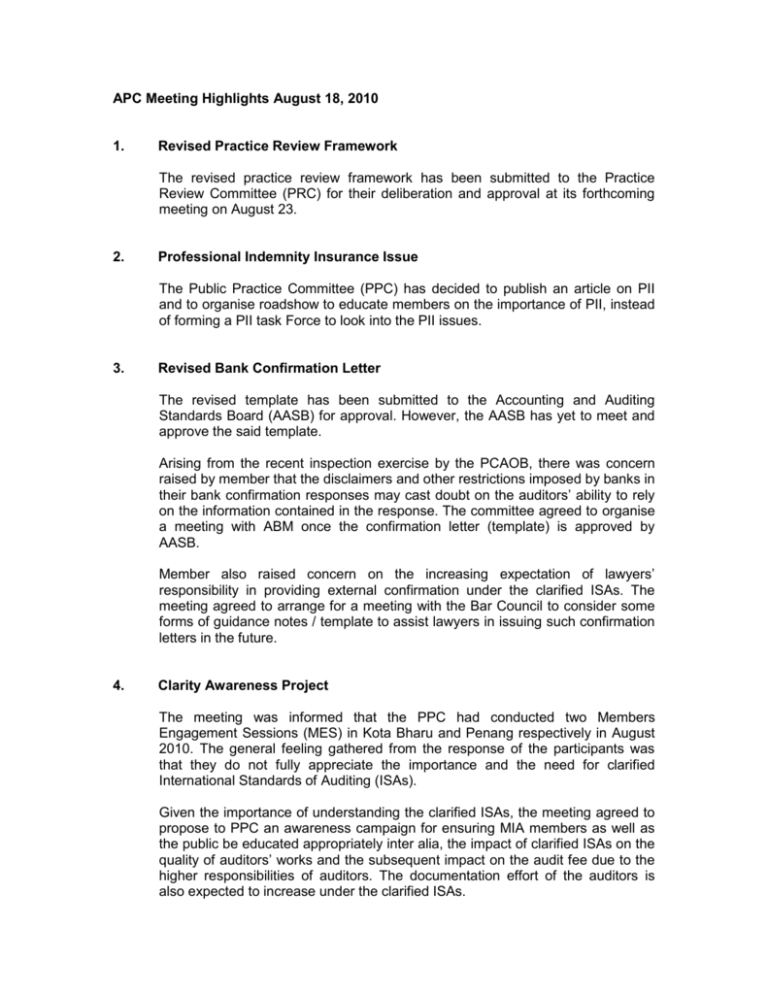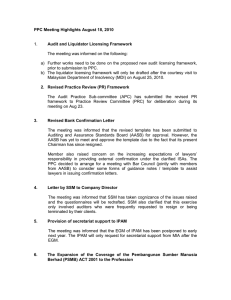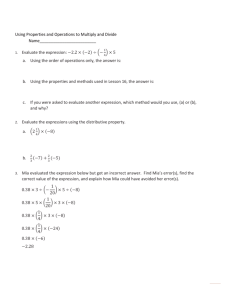HERE
advertisement

APC Meeting Highlights August 18, 2010 1. Revised Practice Review Framework The revised practice review framework has been submitted to the Practice Review Committee (PRC) for their deliberation and approval at its forthcoming meeting on August 23. 2. Professional Indemnity Insurance Issue The Public Practice Committee (PPC) has decided to publish an article on PII and to organise roadshow to educate members on the importance of PII, instead of forming a PII task Force to look into the PII issues. 3. Revised Bank Confirmation Letter The revised template has been submitted to the Accounting and Auditing Standards Board (AASB) for approval. However, the AASB has yet to meet and approve the said template. Arising from the recent inspection exercise by the PCAOB, there was concern raised by member that the disclaimers and other restrictions imposed by banks in their bank confirmation responses may cast doubt on the auditors’ ability to rely on the information contained in the response. The committee agreed to organise a meeting with ABM once the confirmation letter (template) is approved by AASB. Member also raised concern on the increasing expectation of lawyers’ responsibility in providing external confirmation under the clarified ISAs. The meeting agreed to arrange for a meeting with the Bar Council to consider some forms of guidance notes / template to assist lawyers in issuing such confirmation letters in the future. 4. Clarity Awareness Project The meeting was informed that the PPC had conducted two Members Engagement Sessions (MES) in Kota Bharu and Penang respectively in August 2010. The general feeling gathered from the response of the participants was that they do not fully appreciate the importance and the need for clarified International Standards of Auditing (ISAs). Given the importance of understanding the clarified ISAs, the meeting agreed to propose to PPC an awareness campaign for ensuring MIA members as well as the public be educated appropriately inter alia, the impact of clarified ISAs on the quality of auditors’ works and the subsequent impact on the audit fee due to the higher responsibilities of auditors. The documentation effort of the auditors is also expected to increase under the clarified ISAs. Among activities that could be organised including press conference and article in Accountants Today. The Secretariat was requested to compile an article on the comparison of the old and new ISAs for publication at the Accountants Today. 5. Dialogue with AOB The meeting was informed that there will be a second dialogue with AOB in the near future on AOB’s review framework. The Secretariat was requested to seek members’ feedback on the possible questions to be raised at the second dialogue. 6. Positioning Malaysia as the Regional Hub for Accountancy Education and Training En Khairul, Head of International Affairs of MIA presented his proposal on “Positioning Malaysia as the Regional Hub for Accountancy Education and Training”, which he has presented earlier to the National Professional Services Council (NAPSEC) and Malaysian Services Development Council (MSDC) and the MIA’s Public Practice Committee. Members discussed on the following issues: a) Human capital issue where there is an alarming attrition rate in the number of accountants / auditors to countries such as Singapore, China and Australia, and the nation is not churning out enough employer-ready local graduates. The situation is worsen by not allowing foreign graduates to be trained and employed in Malaysia; b) Entry of graduates of non-accountancy disciplines as a member of MIA which is currently not allowed under the Accountants Act; c) Re-branding of the accountancy profession to attract more talents into the profession. The Secretariat highlighted that the Malaysia-India Comprehensive Economic Co-operation Agreement (CECA) which is expected to be signed by the end of 2010, will open up trade opportunities between the 2 countries. Members might want to think of its impact on their practices. A circular will be sent to all member firms on any difficulties encountered when trying to set-up offices in India, in order for MIA to bring these issues for discussion during the on-going trade negotiation. 7. IFRS for SMEs The meeting was informed that no position has been taken by MASB on the adoption of IFRS for SMEs as of today. The MASB would like to hear members’ view on whether IFRS for SMEs should be adopted for application by private entities in Malaysia. APC members are requested to go through the questionnaire issued by MASB and consider submitting their view to MASB. The due date for submission is 30 Sept 2010. 8. Updates on Issues Raised at Corporate Practice Consultative Forum (CPCF) Questionnaire by SSM to Company Director on Resignation of Auditors The meeting was informed that SSM has taken cognizance of the issues raised and the questionnaire will be re-drafted. SSM also clarified that this exercise only involved auditors who were frequently requested to resign or being terminated by their clients. Striking-off Company The meeting was informed that the process of striking-off only involved the company and its officer, As such, SSM is not duty bound to notify the auditors. However, auditors will still have recourse to recover any outstanding professional fee by filling an objection pursuant to Section 308 of the CA 1965 as highlighted in PN 5/2009. Section 132E The meeting was informed that the Registrar has no power to exempt or relieve the requirements of any provision in the CA 1965. Therefore, exempt private companies are still subject to Section 132E until the new Companies Act takes effect. The meeting was also informed that SSM has highlighted that they noticed some companies limited by guarantee are using the PERS instead of FRS when preparing their financial statements. This is not a correct practice as companies limited by guarantee have significant public interest and the appropriate accounting standards should be the FRS. 9. Proposed Enhancement to the Present System of Application Audit Licence The objectives of the proposed changes are to ensure the applicants possess up-to-date knowledge in auditing in the Malaysian environment and to enable incoming auditors who have left the public practice, a shorter timeframe to gain his or her Audit Licence. The meeting deliberated on the proposed new audit licence application framework and members highlighted the following amendments: a) The minimum requirement of one year post-MIA membership is not stated clearly in the proposal; b) Supervisory role and recent audit experience need to be further defined; c) To include illustrations / examples to make it more understandable. There were also suggestions to adopt a macro approach in reviewing the current framework and to consider the issue of reciprocalness in the recognition of professional accountancy qualifications vis-à-vis other countries such as Indonesia or India. Study on Audit Exemption in Singapore The meeting also decided to obtain funding from MAREF to study the impact of audit exemption in Singapore and appealed to PPC on the networking trip to Singapore under the flagship of MIA. The meeting agreed that all expenses will be borne by the members themselves. The meeting agreed to propose to MIA International Affairs Dept for organising the above networking trip with the Institute of Certified Public Accountants of Singapore (ICPAS) and to consider undertaking the audit exemption research in Singapore as a case study. 10. Any Other Matters IFRIC 15 The meeting was informed that the endorsement of IFRIC 15 ‘Agreements for the Construction of Real Estate’ has been deferred due to its potential conflicts with the Revenue Standards IAS 18. Besides that, other countries like Singapore, Korea, Taiwan and Belgium are also complaining about the same issue, pending convergence.








